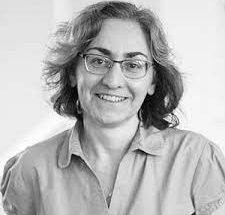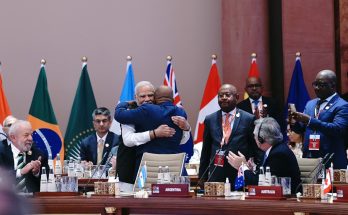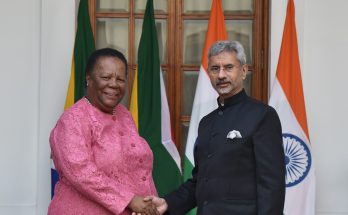 Recently, Nigeria has been under tremendous pressure from armed rebels of Boko Haram. More than 100 people have been killed by this brutal terrorist group in less than a week in the northern part of the country, especially the Borno state. This Monday, several houses were set on fire by the group, killing unknown number of people. Few days earlier, it had shot dead more than 25 people, mostly fishermen. Before that, more than 45 people were killed when suspected suicide bombers attacked the Monday market in the same state. The police suspect Boko Haram to be behind this attack too.
Recently, Nigeria has been under tremendous pressure from armed rebels of Boko Haram. More than 100 people have been killed by this brutal terrorist group in less than a week in the northern part of the country, especially the Borno state. This Monday, several houses were set on fire by the group, killing unknown number of people. Few days earlier, it had shot dead more than 25 people, mostly fishermen. Before that, more than 45 people were killed when suspected suicide bombers attacked the Monday market in the same state. The police suspect Boko Haram to be behind this attack too.
The terrorist group remains a significant problem confronting the democratic government of President Goodluck Jonathan. It has pressurised the government for the release of members from captivity, withdrawal of the army in Maiduguri, nationwide imposition of Sharia law and to expel Christians from Muslim-majority north. In fact, the group is so brutal that human rights lawyer Emmanuel Ogebe Boko Haram considers it as “the second deadliest terror group in the world” after Taliban. Boko Haram is a radical Islamist militant group in northern Nigeria, formed by Muslim cleric Mohammad Yusuf in 2002 in Maiduguri. The group is also known as Jama’atu Ahlis Sunna Lidda’Awati Wal-Jihad or ‘People Committed to the Prophet’s Teachings for Propagation and Jihad’. If loosely translated, Boko Haram means “Western education is forbidden”. The goal of Boko Haram is to establish an Islamist state based on Sharia law.
The group turned violent in 2009 after the clash with the Nigerian Police Force and the death of Yusuf under suspicious circumstances while in police custody. Boko Haram since then has attacked Nigeria’s police and military, politicians, public institutions, religious buildings with increasing regularity. It has killed more than 5000 people and displaced over three lakh people in related violence.
Boko Haram is perhaps the most alarming humanitarian crisis Nigeria is facing. Having emerged as the most atrocious and inhumane terrorist group, it abducted 276 Christian schoolgirls on April 14 this year from Chibok with the aim of converting them to Islam and then selling them in slave markets. Now it claims to have converted all the Christian girls into Islam and married them off.
Boko Haram does not participate in the political system of Nigeria, as the fundamentals of Islam forbid the participation unless the system is based on Sharia law. The group focuses specifically on Nigeria and adjacent countries rather than on International Jihad. Boko Haram believes the Nigerian state is formed by western values and education, both of which are against the will of Allah.
P olitically, it was believed that since Goodluck Jonathan, a Christian from south, who won the 2011 presidential elections, failed to replace the system of alternating presidencies between Muslims of north and Christians of south with a new balancing structure, it has led to marginalisation of Muslims that in turn has provoked the current wave of conflict in Nigeria.
olitically, it was believed that since Goodluck Jonathan, a Christian from south, who won the 2011 presidential elections, failed to replace the system of alternating presidencies between Muslims of north and Christians of south with a new balancing structure, it has led to marginalisation of Muslims that in turn has provoked the current wave of conflict in Nigeria.
Boko Haram, however, is not a monolithic entity with a unified purpose. It is splintered into at least three factions: One remains moderate and welcomes an end to violence, another wants peace agreement and a third is led by Abubakar Shekau, which wants to implement strict Sharia laws across Nigeria. The group collects funds through bank robberies, kidnapping ransoms, smuggling weapons and donations from members. Its links with Al-Qaeda in the Islamic Maghreb (AQIM) opened doors for more funding from groups in Saudi Arabia and the U.K.
International response to Boko Haram
The group grabbed major international attention after its mass abduction of Christian teenage girls from a school. Despite the government’s efforts to rescue the hapless children, nothing could be done so far, even with international help. The group, through a recently released video, claimed that it has married them off, after converting them to Islam.
The United Nations Security Council has placed Boko Haram on its Al-Qaeda Sanctions list following such a request from the Nigerian Government. The United States has linked the group with AQIM and other global Jihadi organisations. On November 13, 2013, the US government declared Boko Haram as a Foreign Terrorist Organisation (FTO) as well as Specially Designated Global Terrorists.
Response of the Nigerian Govt
The Nigerian government has adopted a mix of solutions to deal with Boko Haram. Troops have been deployed to the ten states in the region where the group has been active since 2004, including Borno, Kaduna, Plateau and Baruchi. A Joint Task Force (JTF) has been established in the states of Baruchi, Yobe, Borno, Gombe, Taraba and Adamawa. In January 2012, 11 Boko Haram members were shot down in Maiduguri by the Nigerian military. To check the terrorists activities effectively, President Jonathan brought in a legislation, the Terrorism (Prevention) Act, in 2011. This legislation was amended in 2012 to make it more effective. The Act provides for death penalty to anyone who is convicted of terrorist activities.
Besides these measures, the government had declared the state of emergency twice in Nigeria. The first time was in December 2011 in Borno, Yobe, Plateau and Niger states. Again in May 2013, President Jonathan declared emergency in three states — Borno, Yobe and Adamawa.
Current situation
There were reports of agreements between the Nigerian government and the Boko Haram group. But Boko Haram spokesman Abu Qa Qa has denied having reached any ceasefire agreement. “We are telling the government to understand that if it is not ready to embrace Sharia and the Quran as the guiding book from which the laws of the land derive, there shall be no peace… [and media agencies] should understand that for us there is no difference between those fighting with guns and with the pen”, the spokesman said, warning even the media.
Boko Haram has captured several local governments in Adamawa, Borno and Yobe states. However, recently, it suffered a setback when local hunters captured Adamawa town on November 13 and killed more than 75 insurgents.
Solution
Many things needed to be done to find an effective solution to the Boko Haram problem. First, the security should be improved, with better coordination between the military and police. Right now, security forces are underpaid as well as under-trained. The military also seems to be less sympathetic to the cause of northerners. Such a situation needs to be changed.
Second, the socio-economic structure of the country should be improved by investing more in employment and providing compulsory and free education, so that people are not left behind and are not radicalised by the group.
Third, the government should constitute a ‘discussion and reconciliation committee’ in order to review the problem extensively, find solutions and make peace with Boko Haram.
Fourth, the focus should be on providing humanitarian assistance to the millions of people who have been affected by the struggle between Boko Haram and the State. Fifth, Nigeria should improve its leadership qualities, thereby making efforts to wipe out corruption and create a system of checks and balances in order to ensure efficiency.
Sixth, many members of Boko Haram are from neighbouring countries of Chad, Cameroon and Niger. So, border security should be tightened along with making efforts to ensure international cooperation.
(The writer is a Research Intern at Observer Research Foundation, Delhi)
Courtesy: ORF
Author Profile
- India Writes Network (www.indiawrites.org) is an emerging think tank and a media-publishing company focused on international affairs & the India Story. Centre for Global India Insights is the research arm of India Writes Network. To subscribe to India and the World, write to editor@indiawrites.org. A venture of TGII Media Private Limited, a leading media, publishing and consultancy company, IWN has carved a niche for balanced and exhaustive reporting and analysis of international affairs. Eminent personalities, politicians, diplomats, authors, strategy gurus and news-makers have contributed to India Writes Network, as also “India and the World,” a magazine focused on global affairs.
Latest entries
 DiplomacyApril 10, 2024Diplomat-author Lakshmi Puri pitches for women power at LSR
DiplomacyApril 10, 2024Diplomat-author Lakshmi Puri pitches for women power at LSR India and the WorldApril 6, 2024UN envoy pitches to take India’s solutions to the world stage
India and the WorldApril 6, 2024UN envoy pitches to take India’s solutions to the world stage CultureApril 5, 2024Youth in Diplomacy: Making it Matter with LSR Model UN 2024
CultureApril 5, 2024Youth in Diplomacy: Making it Matter with LSR Model UN 2024 India and the WorldMarch 28, 2024India to China: Normalization of troops deployment imperative for restoring ties
India and the WorldMarch 28, 2024India to China: Normalization of troops deployment imperative for restoring ties







